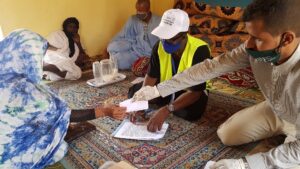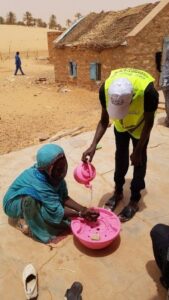The ARC Replica drought insurance enabled the World Food Programme (WFP) to assist nearly 4,000 vulnerable people in Mauritania during the lean season, a critical lifeline during the COVID-19 crisis.
In Mauritania, repeated climatic shocks cause thousands of people to become food insecure and malnourished every year. For example, according to the projections of the Cadre Harmonisé (November 2019), some 609,000 people needed food assistance between June and September 2020 as a result of the poor rainy season in 2019. The COVID-19 pandemic that arrived in March 2020 and the resulting restrictions put in place to prevent its spread have significantly worsened the situation, further degrading the food and nutritional security of the poorest households. Impact studies have revealed a sharp increase in food insecurity and malnutrition in the country.
In 2013, Mauritania was one of the first countries to join the African Risk Capacity (ARC), a specialized agency of the African Union that helps African governments better understand drought risks, access early warning tools, and develop a preparedness plan to protect the livelihoods of vulnerable populations financed through a pan-African climate risk insurance pool. Since 2018, the ARC Replica initiative has enabled WFP to replicate this government insurance in order to reach more people with life-saving assistance after extreme weather events trigger a payout.
Due to a presidential transition last year, the Mauritanian government was unable to purchase an insurance policy for 2019. Despite this and thanks to the flexibility of the ARC Replica insurance, WFP was still able to subscribe to a policy, which proved critical as the 2019 rainy season was exceptionally bad.
Once the lack of rainfall reached a dangerous threshold, a payout of USD 167,000 was triggered for WFP that would be used to assist vulnerable populations for the 2020 pre-lean season. This money enabled WFP to distribute cash transfers to nearly 4,000 people before the peak of the lean season in Tagant, a region heavily affected by drought and where 42.9% of the population was food insecure according to the October 2019 FSMS survey.
“This assistance allows us to better prepare for the coming lean season by buying meat, oil, food that allows us to eat well and be healthy because we don’t know what to expect,” says Fatou Saleck, a local resident.

Photo : Beneficiaries receiving cash ration / WFP/Damien Vaquier
Restrictions in order to avoid the spread of COVID (closure of borders with neighbouring countries, closure of inter-regional borders, establishment of a curfew, and closure of markets) have also had serious consequences for the inhabitants. “We could no longer leave our homes or even go to the city to get supplies and work. We had to go into debt because we no longer had any income. Fortunately, this assistance also enabled us to pay off some of our debts, ” continues Fatou.
Thanks to the rapid mobilisation of funds and the entire preparation process prior to the intervention (determination of the area and intervention methods before the funds were even received), WFP food assistance was distributed in May, more than a month before the peak of the lean season (June-July), in the midst of the COVID context, thus making it possible to mitigate this double shock suffered by vulnerable populations.
WFP had to adapt its operations to be able to ensure that both beneficiaries and humanitarian workers were adhering to public health safety measures. To do this, awareness campaigns were carried out regularly, hand washing was required before and after distribution, masks were mandatory for staff and social distancing measures were put in place.

Photo : A beneficiary washing her hands before receiving her ration -WFP/Damien Vaquier
“The COVID-19 pandemic combined with the lean season represents an unprecedented challenge with significant repercussions on food security and nutrition. Maintaining ongoing humanitarian assistance to vulnerable groups and adapting to the socio-economic impacts of COVID-19 is therefore paramount to saving lives and livelihoods,” says Nacer Benalleg, WFP Representative and Country Director in Mauritania.
Contribution by World Food Program (WFP)
